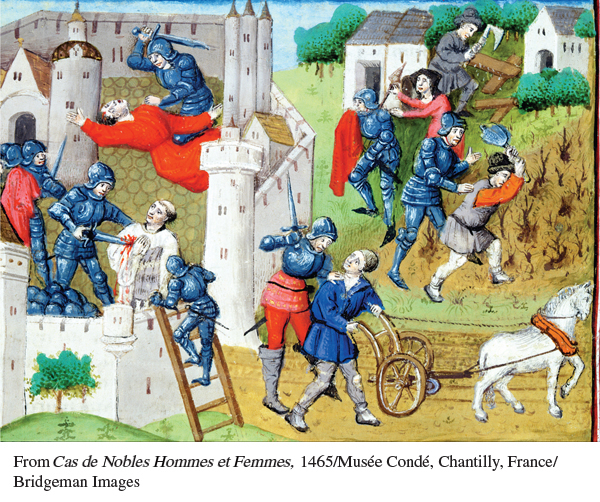A History of Western Society: Printed Page 322
A History of Western Society, Value Edition: Printed Page 309
A History of Western Society, Concise Edition: Printed Page 323
Introduction for Chapter 11
11
The Later Middle Ages
1300–1450
During the later Middle Ages the last book of the New Testament, the book of Revelation, inspired thousands of sermons and hundreds of religious tracts. The book of Revelation deals with visions of the end of the world, with disease, war, famine, and death — often called the “Four Horsemen of the Apocalypse” — triumphing everywhere. It is no wonder this part of the Bible was so popular in this period, for between 1300 and 1450 Europeans experienced a frightful series of shocks. The climate turned colder and wetter, leading to poor harvests and famine. People weakened by hunger were more susceptible to disease, and in the middle of the fourteenth century a new disease, probably the bubonic plague, spread throughout Europe. With no effective treatment, the plague killed millions of people. War devastated the countryside, especially in France, leading to widespread discontent and peasant revolts. Workers in cities also revolted against dismal working conditions, and violent crime and ethnic tensions increased as well. Massive deaths and preoccupation with death make the fourteenth century one of the most wrenching periods of Western civilization. Yet, in spite of the pessimism and crises, important institutions and cultural forms, including representative assemblies and national literatures, emerged. Even institutions that experienced severe crisis, such as the Christian Church, saw new types of vitality.▪

CHAPTER PREVIEW
How did climate change shape the late Middle Ages?
How did the plague reshape European society?
What were the causes, course, and consequences of the Hundred Years’ War?
Why did the church come under increasing criticism?
What explains the social unrest of the late Middle Ages?
Chronology
| 1300–1450 | Little ice age |
| 1309–1376 | Babylonian Captivity; papacy in Avignon |
| 1310–1320 | Dante writes Divine Comedy |
| 1315–1322 | Great Famine in northern Europe |
| 1320s | First large- |
| 1337–1453 | Hundred Years’ War |
| 1347 | Black Death arrives in Europe |
| 1358 | Jacquerie peasant uprising in France |
| 1366 | Statute of Kilkenny |
| 1378–1417 | Great Schism |
| 1381 | English Peasants’ Revolt |
| 1387–1400 | Chaucer writes Canterbury Tales |